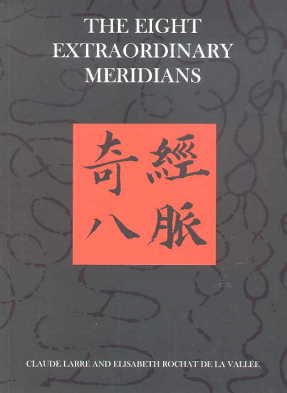SEARCH / BROWSE
The Eight Extraordinary Meridians
LARRE Claude & ROCHAT DE LA VALLEE Elisabeth [Other titles by this author]
ISBN: 9781872468136
Monkey Press 1997 1st Edition
AU $74.95
Currently Out of Stock Please Inquire for Due Date

This book presents a detailed examination of the eight extraordinary meridians from the texts of the Neijing, the Nanjing and their commentaries. The first section provides an overview of the eight as revealing the basic interaction of yin and yang within the body, providing the foundation for the movement of qi and the underlying framework for the main meridian system. There follows an in-depth description of the du mai, the governor vessel, with a study of the point names as a key to its functions. With the subsequent presentation of the ren mai, chong mai and dai mai we build up a simple structural picture of the body which is further elaborated in the presentations of the qiao and wei mai. Each Chinese meridian name is discussed, looking at the etymology and nuances of meaning, to give fresh insight into the function of these eight extraordinary meridians. Classical descriptions of points and pathways are explored in depth. An index of Chinese characters and main concepts is included. Excerpt from The Eight Extraordinary Meridians: Elisabeth Rochat: 'These meridians are older, more ancient than the ordinary meridians, and when extraordinary circumstances exist outside, and the twelve main meridians can no longer ensure the maintenance of the twelve areas of the body, there is a return to a more ancient and deeper regulation of life. Here we have one of the meanings of these extraordinary meridians and of their role: it is to preserve the norm, but at a deeper level. 'Suwen' chapter 2 gives us a presentation of the four seasons. 'The first part of this chapter is the presentation of spring, summer, autumn and winter, the proper qualities of each of these seasons and the appropriate conduct to adopt and follow in order to respond to the season and be in good health. But in the second part we have an example of extraordinary, unforeseeable circumstances, very bad weather with hurricanes, tornadoes, very heavy rain, or drought - the kind of circumstances which endanger all living beings. In this case, the saint of the text is able to prepare within himself the regulation of his animation, to correct the movement of all the circulation, and this is the reason why he has no extraordinary illness. This is the same word ‘extraordinary’ and in this context the meaning is that this extraordinary illness came about through very strange and unusual circumstances. 'An ordinary man who is unable to return to something deeper than the twelve meridians in the organisation of his life, is unable to cope with this circumstance and to resist the perversion of his surroundings. And we can see that this is one way in which the extraordinary meridians regulate in the depths because they are the last resort, or the deepest resort, like a kind of prototype of the whole organisation and the relationships that take place in the unfolding of the body. We can find the same opposition which is at the same time complementary between what is zheng, correct or ordinary or usual, and qi, extraordinary.'
210 x 145mm
256pp
(For this item please quote stock ID 9201)
Related Subject Areas:
